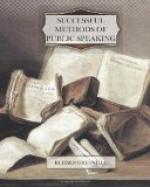The four orations in Deuteronomy, by Moses, are highly commended for their tenderness, sublimity and passionate appeal. You can advantageously read them aloud.
The oration of Pericles over the graves of those who fell in the Peloponnesian War, is said to have been the first Athenian oration designed for the public.
The agitated political times and the people’s intense desire for learning combined to favor the development of oratory in ancient Greece. Questions of great moment had to be discust and serious problems solved. As the orator gradually became the most powerful influence in the State, the art of oratory was more and more recognized as the supreme accomplishment of the educated man.
Demosthenes
Demosthenes stands preeminent among Greek orators. His well-known oration “On the Crown,” the preparation of which occupied a large part of seven years, is regarded as the oratorical masterpiece of all history.
It is encouraging to the student of public speaking to recall that this distinguished orator at first had serious natural defects to overcome. His voice was weak, he stammered in his speech, and was painfully diffident. These faults were remedied, as is well-known, by earnest daily practise in declaiming on the sea-shore, with pebbles in the mouth, walking up and down hill while reciting, and deliberately seeking occasions for conversing with groups of people.
The chief lesson for you to draw from Demosthenes is that he was indefatigable in his study of the art of oratory. He left nothing to chance. His speeches were characterized by deliberate forethought. He excelled other men not because of great natural ability but because of intelligent and continuous industry. He stands for all time as the most inspiring example of oratorical achievement, despite almost insuperable difficulties.
Cicero
The fame of Roman oratory rests upon Cicero, whose eloquence was second only to that of Demosthenes. He was a close student of the art of speaking. He was so intense and vehement by nature that he was obliged in his early career to spend two years in Greece, exercising in the gymnasium in order to restore his shattered constitution.
His nervous temperament clung to him, however, since he made this significant confession after long years of practise in public speaking. “I declare that when I think of the moment when I shall have to rise and speak in defense of a client, I am not only disturbed in mind, but tremble in every limb of my body.”
It is well to note here that a nervous temperament may be a help rather than a hindrance to a speaker. Indeed, it is the highly sensitive nature that often produces the most persuasive orator, but only when he has learned to conserve and properly use this valuable power.
Cicero was a living embodiment of the comprehensive requirements laid down by the ancients as essential to the orator. He had a knowledge of logic, ethics, astronomy, philosophy, geometry, music, and rhetoric. Little wonder, therefore, that his amazing eloquence was described as a resistless torrent.




